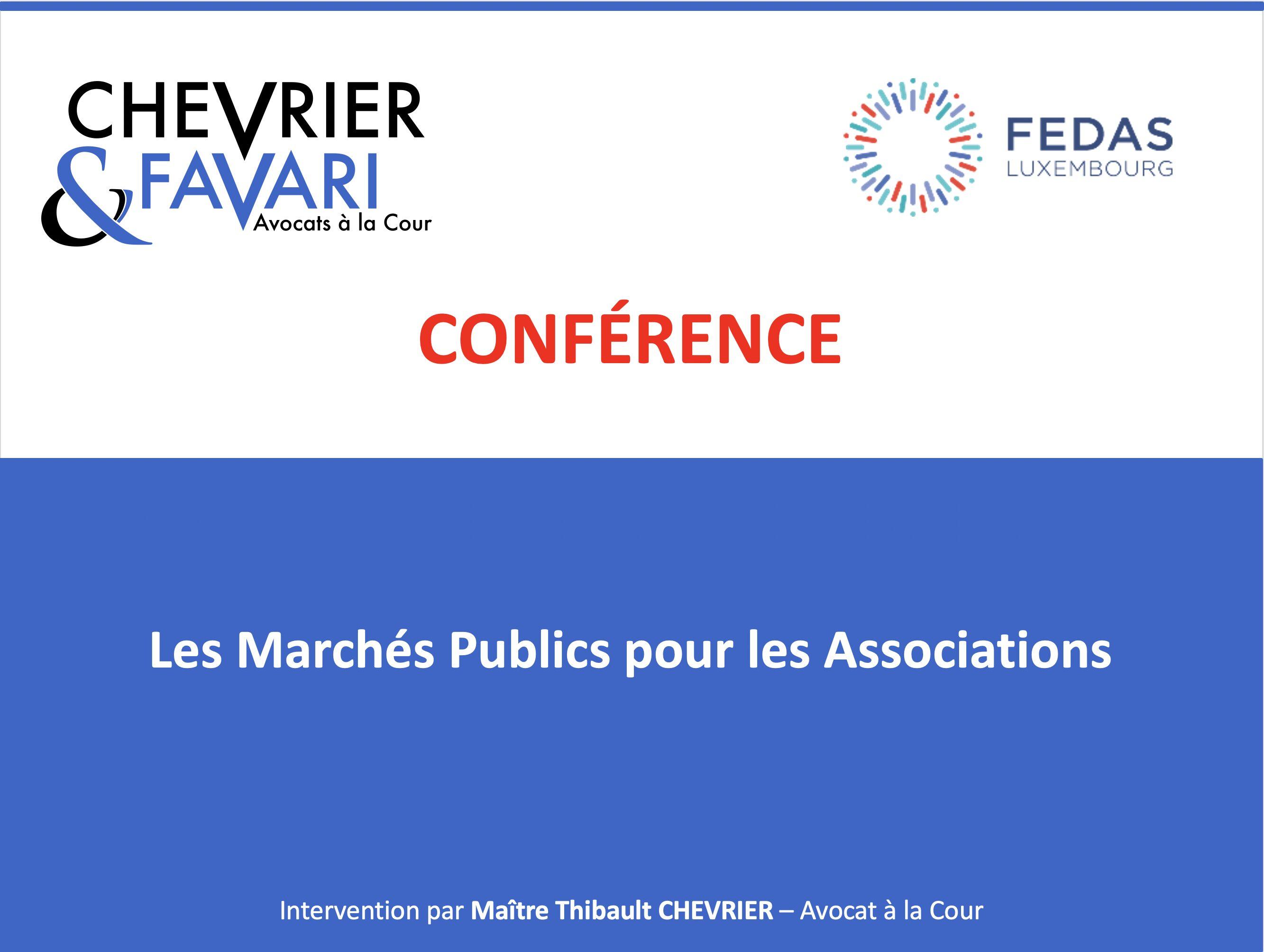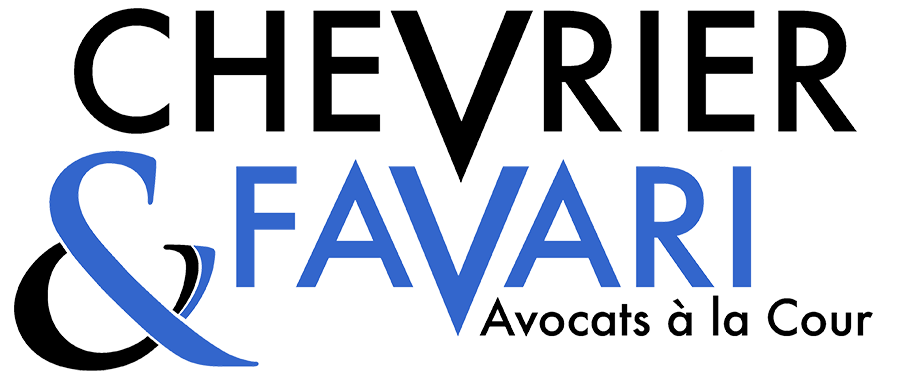Public Procurement for Associations – Speech at a conference organised by FEDAS

On 15 January 2025, Thibault CHEVRIER, Lawyer at the Court of Luxembourg and Partner at the law firm CHEVRIER & FAVARI, spoke at a conference organised by the Federation of Actors in the Social Sector in Luxembourg (FEDAS) on the topic: “Public Procurement for Associations.“
FEDAS is the main network of social and societal organisations acting as a multi-professional employers’ federation, representing actors in the social sector and encouraging social activity in Luxembourg.
This intervention focused more specifically on:
- the potential qualification of an association as a public body;
- the public subsidisation of a project carried out by an association;
1. Classification as a public body within the meaning of the legislation on public procurement in Luxembourg
It is interesting to note that the classification of a public body can be applied to a private entity.
For example, a non-profit association or a foundation may be classified as such if it was created for the public good and, for example, is mainly publicly funded.
In Luxembourg, Article 2 d) of the Law of 8 April 2018 on public procurement (LMP) thus provides that a public law body is defined as:
any body with all of the following characteristics:
i. it was created to specifically meet needs in the general interest that are not of an industrial or commercial nature;
ii. it has legal personality; and
iii. either it is predominantly funded by the State, municipalities or other public bodies, or its management is subject to control by these authorities or bodies, or its administrative, management or supervisory body is composed of members of whom more than half are appointed by the State, municipalities or other public bodies.
As for the general interest, a decision of the administrative court of 19 November 2012 (docket no. 29395) recognises the Société Nationale des Habitations à Bon Marché (SNHBM), which operates as a public limited company for social housing, as a public law body:
As for the concept of general interest, this must be assessed very broadly. Thus, an activity that could have been competitive and profitable can be classified as being in the general interest in view of the objective pursued by the public authorities. There is still satisfaction of needs in the general interest when it concerns organisations that assume missions falling within the scope of “essential missions devolved to the public authorities”, such as social housing in particular.
From the point of view of funding that is mainly public, the administrative court observed, in another decision of 1 December 2014, that this had to be assessed in its entirety, its consistency and a certain permanence:
Finally, with regard to the organic criterion set out in Article 2 of the Law of 25 June 2009, itself subdivided into three alternative criteria, which define the three forms in which a public body appears as three variants of a “close dependence” on another contracting authority, namely either that the organisation pursues an activity financed for the most part by the State, regional or local authorities or other bodies governed by public law, or is controlled by the latter, or is managed by an administrative, managerial or supervisory body the majority of whose members are appointed by the State, regional or local authorities or other bodies governed by public law, it should be emphasised that the concept of “ financing’, appearing in the first sub-criterion, implies that not all aid is covered; in fact, only services that finance or support, by means of financial aid paid without specific consideration, the activities of the entity concerned can be qualified as ‘public financing’, thus encompassing subsidies, loans, equity investments or capital endowments.
It is also necessary for the funding to be the majority and permanent. These two characteristics are normally linked, that is to say that, to assess whether a majority, meaning “more than half” of the resources, is of public origin, it is necessary to consider the resources over a sufficiently long period for it to be possible to speak of permanence. Furthermore, in order to arrive at a correct assessment of the percentage of public funding of a given organisation, it is necessary to take into account all the income from which it benefits, including that which results from commercial activity. Finally, if the text mentions “majority” funding from public funds, this necessarily implies that a body may also be partially funded in another way, without losing its status as a contracting authority.”
Public procurement law in Luxembourg therefore does not distinguish according to the form (private or public) of the buyer in the context of a potential qualification as a contracting authority.
It will be necessary to analyse whether or not there are close links with public authorities that may lead to an association being required to comply with all public procurement law (publication of calls for tenders, etc.) for all its purchases.
At the same time, it should be noted that a construction project carried out by an association may also require compliance with public procurement legislation if it is of a certain size and is subsidised above a certain threshold.
2. Public subsidisation of a project carried out by an association in Luxembourg, which may lead the latter to have to comply with public procurement law
In addition to the potential qualification as a public law body, public procurement law in Luxembourg has indeed established a specific legal framework for subsidised projects.
The purpose of this regulation is to prevent contracting authorities from shirking their own obligations by financing a third party to carry out the project on their behalf.
In this context, Article 57 of the LMP states that:
Art. 57. Contracts subsidised by contracting authorities
This Book applies to the awarding of:
a) works contracts subsidised directly by more than 50 per cent by contracting authorities, whose estimated value, excluding VAT, is equal to or greater than the value provided for in Article 13 of Directive 2014/24/EU of the Parliament and of the Council of 26 February 2014 on the award of public contracts and repealing Directive 2004/18/EC and which concern one of the following activities:
i. civil engineering activities listed in Annex II;
ii. construction work for hospitals, facilities intended for sports, recreation and leisure, school and university buildings and buildings used for administrative purposes;
b) service contracts subsidised directly by more than 50 per cent by contracting authorities, whose estimated value, excluding VAT, is equal to or greater than the value provided for in Article 13 of this directive, and which are linked to a works contract as referred to in point a).
The contracting authorities that provide the subsidies referred to in paragraph 1, points a) and b), shall ensure compliance with the provisions of this Book when they do not award the subsidised contracts themselves. They are required to comply with this Book when they award these contracts themselves in the name and on behalf of other entities.
The values provided for in paragraph 1 are amended in accordance with Article 52.
It follows from this definition that the Luxembourg rules on public procurement will apply to works contracts:
- with a value exceeding €5,538,000 excluding VAT (threshold applicable in 2024/2025);
- subsidised by more than 50% by a public authority;
These rules will also apply to service contracts (e.g. architectural or engineering services) that exceed the scale thresholds (€221,000 excluding VAT (2024/2025 threshold)) and that are related to subsidised construction work according to the parameters seen above.
These two scenarios should be kept in mind when an association or foundation wishes to engage in major construction or renovation projects, while at the same time applying for subsidies for this purpose.
The main risk is that, in the event of non-compliance with the applicable rules, the authority subsidising the project may decide to conclude that the project is ineligible and request the return of the aid granted.
❖
Please do not hesitate to contact us if you have any questions regarding the subsidising of an association’s project or regarding public procurement law in Luxembourg.
